Nick Clegg has accused the former chancellor George Osborne of casually cutting the benefits of the poorest people in society because he believed taking the austerity axe to welfare would boost Conservative popularity.
In a candid interview looking back on his five years as deputy prime minister in the Tory-Lib Dem coalition, Clegg said he found the behaviour of his senior Conservative partner “very unattractive, very cynical”.
“Welfare for Osborne was just a bottomless pit of savings, and it didn’t really matter what the human consequences were, because focus groups had shown that the voters they wanted to appeal to were very anti-welfare, and therefore there was almost no limit to those anti-welfare prejudices,” he told the Guardian.
Speaking before the publication of his anticipated political memoir, written after his party was reduced to eight seats in last year’s general election, Clegg hit out at David Cameron and his Conservative partners in government. He said the former Tory leader or the chancellor – “I honestly can’t remember whom – looked genuinely nonplussed and said: ‘I don’t understand why you keep going on about the need for more social housing – it just creates Labour voters.’ They genuinely saw housing as a Petri dish for voters. It was unbelievable.”
The Lib Dem MP also had harsh words for the current prime minister, Theresa May, with whom he clashed repeatedly when she was home secretary. He claimed that she – and advisers who have since become the joint chiefs of staff in Downing Street – tried to manipulate a Home Office report on immigration that was part of a cross-government exercise into the costs and benefits of EU membership.
“She kept saying there was this terrible ‘abuse’ of freedom of movement, when simply describing EU citizens exercising their right to come and work in the UK. They tried to insert statistics suggesting the number of UK citizens living and working in other EU countries was half a million lower than any other mainstream estimate,” he said.
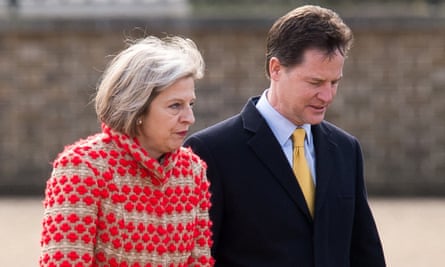
Clegg argued that May would not miss an opportunity to “pander to the cardboard-cutout prejudices that large parts of her party have about Europe”. “That’s clearly what she and her team were doing when they were trying to insert erroneous facts into this report on freedom of movement.”
In a wide-ranging interview, Clegg expressed deep frustration that his party had received little credit for its work in the coalition, and admitted to “big mistakes”. He also:
- said he could now see that his decision to back a policy that would triple tuition fees to £9,000, breaking a Lib Dem pledge, was like delivering a punch in the face to parents who dreamed of watching their children graduate.
- described how he became “fat, pale and unhealthy” as he stopped exercising and began smoking too much to cope with the long hours and the stress – leading Paddy Ashdown to berate him for being overweight.
- revealed that he suffered from pneumonia, chest pains, chronic coughs and bronchitis “while trying to look perky in public at all times”.
- described the suggestion, which he says was leaked by Michael Gove, that the Queen had vented her frustration with the EU to Clegg as “complete rubbish”.
- responded to the controversy over his wife, Miriam González Durántez, criticising Samantha Cameron for serving the couple a roast chicken with Hellman’s mayonnaise on the side. “To be fair to Miriam, unless you’re very sensitive about your own mayonnaise, I don’t think that counts as score-settling,” said Clegg.
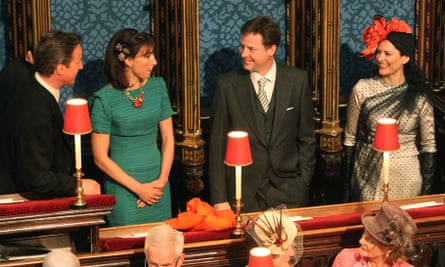
The former deputy prime minister admitted that he had thought long and hard about quitting the government in the years after his popularity slumped, and he realised that his political legacy could be “a lack of trust”.
“In the end, I thought, it’s the worst of both worlds: you’ve created a government that lots of people heap opprobrium on you for, and then you quit when you’ve got nothing to show for it,” he said, although he admitted that the tuition fees row was a hammer blow to the Liberal Democrats that it had struggled to recover from. The issue became totemic for his party, and many claim it was the reason the Lib Dems slumped from 57 to just eight MPs. Clegg said the decision enraged people because it felt so personal.
“Getting your kids into university, seeing them in a gown on the mantelpiece – it’s the distillation of a better life for your children. I have spent a lot of time thinking about the emotional pungency of it. It’s like a politician coming out of the television going ‘Bang!’ to my face as a parent. That’s my explanation,” he said.
Clegg spoke about how his whole family had teased him about a spoof song, I’m Sorry, based on his apology over tuition fees, revealing that his nine-year-old son had sung it to him in a supermarket, and that his wife had “hummed along” at times.
But Clegg said the controversy was not his only regret from the coalition years, listing a number of “big mistakes” including the overly cosy press conference in the rose garden that launched the new government, and his agreement to sit beside Cameron at the weekly prime minister’s questions. The decision left him squirming, but unable to speak out, in the face of Labour attacks.

Clegg, who said he was “bowled over” when he first met his wife, described how he became better at coping with the demands of the job and balancing it with family life.
He stopped working into the early hours, only to be woken up through the night by his one-year-old son, and started instead to use the mornings. He got a larger team, joined kickboxing classes, installed a rowing machine near his office, cut back on the cigarettes and ate well.
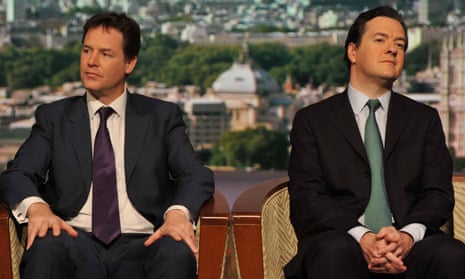
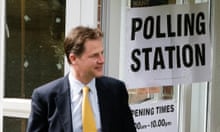

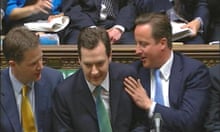

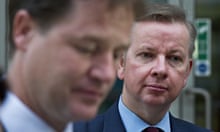
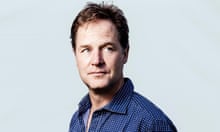

Comments (…)
Sign in or create your Guardian account to join the discussion